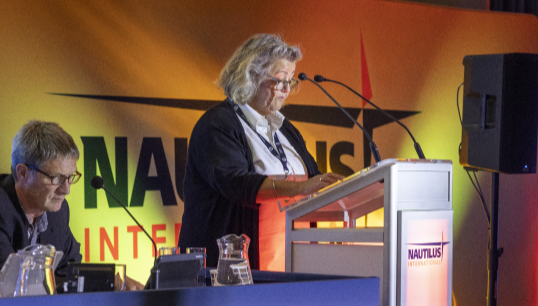
Nautilus has been campaigning for several years to ensure seafarer training is a priority when new fuels and engine types are introduced. Rob Coston looks at what the Union is calling for
At the Nautilus International General Meeting in October 2023, members voted unanimously in favour of a motion committing the Union to campaign on improvements to maritime training – both for cadets and existing seafarers.
Now classified as a resolution, the document Future-proofing Skills and Training lays out exactly what Nautilus will do, and what we will try to achieve for maritime professionals, over the coming years.
This includes two commitments that are especially relevant to the new fuels discussion. Nautilus will:
- work with international partners for a Just Transition to net zero in the interests of maritime professionals
- work to ensure maritime professionals can access training, at no cost to the individual
The General Meeting resolution also draws attention to research commissioned by the Maritime Just Transition Taskforce and conducted by DNV, a classification society, which highlighted the need to train up to 750,000 seafarers by 2050 to meet decarbonisation targets.
Nautilus members endorsed the Taskforce's call for a global consensus on alternative fuels, and for clarity on future training needs to be determined as soon as possible.
They also endorsed a maritime skills strategy produced by the pan-European SkillSea project, which calls for adapted curriculums at maritime colleges to include digital, green, and soft management skills.
Who should pay for new fuels training?
It is worth emphasising that Nautilus is committed to ensuring that members do not have to pay for retraining. The results of our new Mapping the Maritime Future survey suggest that, where seafarers have already received training in new fuels, it is frequently paid for by the company – which is a positive result.
We want seafarers who have had the training to be available for the ships, and not for the ships to be built and nobody trained to work on them.
However, as many as a third of respondents were expected to complete the training during their rest hours or on their own time, which is clearly unacceptable for overworked maritime professionals.
What do our partners want from new fuels training?
Nautilus's message dovetails with that of our international partners. The Union is involved with key maritime bodies that set international standards and policies, and officials are working to ensure members' voices are heard.
The International Transport Workers' Federation (ITF) – of which Nautilus International is an affiliate Union – is part of the Maritime Just Transition Task Force, a body formed at the climate conference COP26 in Glasgow. The Task Force has representatives from UN agencies, shipowners and trade unions, and seeks to ensure that shipping's response to the climate emergency consults the needs of seafarers and communities.
This Task Force put together a 10-point action plan, which was launched at the following climate conference: COP27 in Egypt. Nautilus contributed to the action plan via the ITF. The document includes several points relating to skills around new fuels:
- strengthening global training standards and monitoring which skills are needed/taught
- investing in training and skills
- ensuring a health-and-safety-first approach
Commenting on the action plan, ITF general secretary Stephen Cotton said: 'The good news is that seafarers are prepared and willing to be part of this transition. But crew want to know that the fuels they're handling are indeed safe, and that we as an industry have the training pathways established to upgrade their skills.'
Nautilus is also backing the ITF's next step, announced in 2023 at COP28 in Dubai, which is a new project to prepare seafarers for zero or near-zero emission ships, building on the IMO Greenhouse Gas Strategy. The stated emphasis is to ensure seafarers are not left behind in the transition, and have the skills to work in a safe environment with new technologies and fuels.
When do we want new fuels training to be developed?
'New fuels will be in use before the mandatory training requirements are ready,' stresses Nautilus head of professional and technical David Appleton. 'Industry will begin moving before reviews have taken place. Shipowners will have to be proactive about appropriate training, rather than waiting for the establishment of mandatory requirements, and so will administrations, because those who sit on their hands waiting for mandatory STCW requirements will fall behind.
'For Nautilus, this is about the safety and employability of our members. We want companies to start thinking about this now, and making sure the provision is there, the needs are understood early, and that seafarers aren't waiting around for appropriate programmes to appear. We want seafarers who have had the training to be available for the ships, and not for the ships to be built and nobody trained to work on them.'
The full text of the Nautilus General Meeting resolution Future-proofing Skills and Training is available in the My Nautilus members' area
Tags
